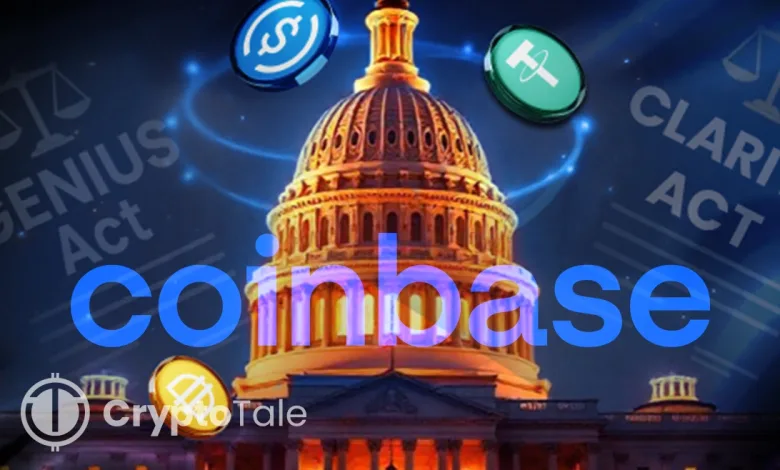Coinbase Urges Treasury to Stay True to GENIUS Act Goals

- Coinbase pressed Treasury to keep GENIUS Act rules true to Congress’s original intent.
- The exchange asked to exclude developers and open-source protocols from oversight.
- It proposed classifying payment stablecoins as cash equivalents for tax and accounting.
Coinbase Global has urged the U.S. Treasury Department to ensure that its forthcoming rules for the Guiding and Establishing National Innovation for U.S. Stablecoins (GENIUS) Act remain consistent with Congress’s original intent.
The exchange submitted its response on November 6, 2025, emphasizing that overstepping the law’s boundaries could restrict innovation and weaken the United States’ competitive edge in digital finance.
Narrow Interpretation of the Law
In its filing, Coinbase advised the Treasury to apply a narrow interpretation of the GENIUS Act. The company argued that the law should not cover non-financial software developers, blockchain validators, or open-source protocol contributors.
According to the exchange, extending regulation to these groups would go beyond what Congress envisioned when passing the legislation. Coinbase Chief Policy Officer Faryar Shirzad stated on X that implementing rules must adhere closely to the bill’s text.
He emphasized that U.S.-issued stablecoins must remain versatile and competitive to achieve global dominance in payments and settlements. His comments reflect the company’s broader concern that excessive regulation could hinder domestic blockchain development while foreign jurisdictions advance more rapidly.
To maintain clarity, Coinbase also asked regulators to confirm that the law’s prohibition on paying interest applies solely to stablecoin issuers. The firm noted that applying this rule to exchanges offering rewards or loyalty programs would conflict with Congress’s carefully defined boundaries.
Defining Stablecoins as Cash Equivalents
Coinbase suggested that stablecoins used mainly for payments should be treated like cash in accounting and taxes. The company explained that since these stablecoins are fully backed and work much like regular money, they should be recognized the same way.
It also asked the Treasury and IRS to take a practical and simple approach when setting tax rules for stablecoin transactions, making it easier for users and businesses to comply. Such treatment, Coinbase said, would support compliance while avoiding unnecessary administrative costs for businesses and consumers using payment stablecoins.
This proposal aligns with Coinbase’s broader stance that stablecoins enhance the efficiency of financial transactions without undermining the banking system. Last month, the firm countered claims that stablecoin expansion could deplete U.S. bank deposits, saying most demand arises from overseas users seeking dollar exposure rather than domestic savers.
Related: Coinbase Nears $2B BVNK Deal to Advance Stablecoin Vision
The GENIUS Act and Global Context
The GENIUS Act, enacted in July 2025, established the first federal framework for regulating U.S. dollar-backed stablecoins. It mandates that all issuers maintain reserves fully backed by cash or liquid assets, submit to annual audits, and adhere to rules governing foreign issuance. President Donald Trump signed the legislation following bipartisan approval in Congress.
The Treasury Department is now reviewing public feedback on the draft rulebook before finalizing implementation. Coinbase’s submission comes as policymakers seek to balance innovation with regulatory oversight across the growing $260 billion stablecoin market.
Analysts at Yahoo Finance reported that Coinbase shares surged by 16 percent after the law’s passage, reflecting optimism about the clearer regulatory landscape. The company’s ongoing collaboration with Circle’s USDC stablecoin remains a major revenue driver within its operations.
Globally, the GENIUS Act places the U.S. on the same level as the European Union’s MiCA rules and Hong Kong’s stablecoin framework. This shows that countries are starting to agree on common ways to regulate digital assets backed by real money, while still keeping financial markets stable.
Similarly, the Bank of England is preparing to release its long-awaited consultation on stablecoin regulation on November 10. Deputy Governor Sarah Breeden stated that the U.K.’s framework would take effect as swiftly as its U.S. counterpart, underscoring how jurisdictions are moving in tandem toward global standards.
Coinbase’s detailed submission highlights how the implementation of the GENIUS Act could define the movement of U.S. digital asset regulation. The company’s call for precision and restraint in rulemaking shows the delicate balance between boosting innovation and ensuring accountability in the growing stablecoin sector.




